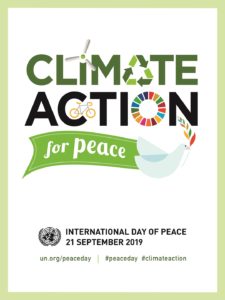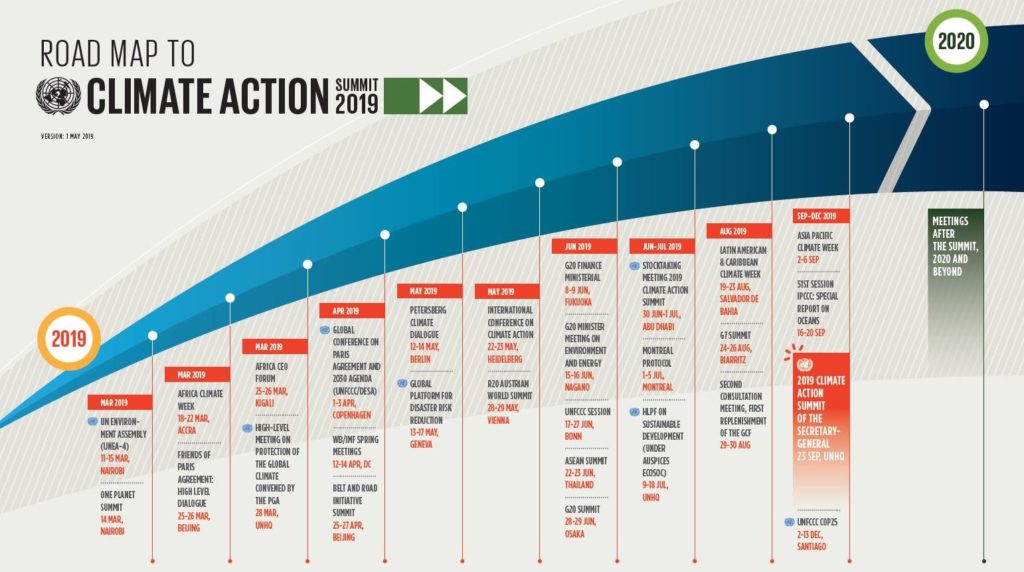In recent months, climate change has set new records, both in terms of physical impacts, global awareness and mobilization on this urgent issue. From the weekly climate strikes, which actively involve young people worldwide, to the release of the latest IPCC Special Report on Climate Change and Land, 2019 has seen a growing number of events.
Relevant climate-related events are also livening up the end of this month, while preparing for the December climate negotiations to be held in Santiago de Chile at the 2019 UN Climate Change Conference (UNFCCC COP25). Climate change will indeed be under the spotlight during the last decade of September, especially in New York City.
Busy days at the UN Headquarters in New York
 Formal events at UN Headquarters in New York will start on September 21, with more than 600 young people participating in the Youth Climate Summit, a platform for young leaders who are driving climate action to showcase their solutions at the United Nations, and to meaningfully engage with decision-makers on the climate change issue. September 21 is also the International Day of Peace, whose theme for 2019 is “Climate Action for Peace”, aimed at drawing attention to the importance of combatting climate change as a way to protect and promote peace throughout the world.
Formal events at UN Headquarters in New York will start on September 21, with more than 600 young people participating in the Youth Climate Summit, a platform for young leaders who are driving climate action to showcase their solutions at the United Nations, and to meaningfully engage with decision-makers on the climate change issue. September 21 is also the International Day of Peace, whose theme for 2019 is “Climate Action for Peace”, aimed at drawing attention to the importance of combatting climate change as a way to protect and promote peace throughout the world.
The Youth Climate Summit is part of a weekend of events and working meetings leading up to the UN Climate Action Summit on Monday, September 23. The Summit will be hosted by the UN Secretary-General António Guterres to boost ambition and accelerate actions to implement the Paris Agreement on Climate Change and to reach the Sustainable Development Goals. Countries made commitments when the Paris Agreement was adopted, including to submit new Nationally Determined Contributions (NDCs) in 2020: prior to the 2020 deadline, the Secretary-General is calling on all leaders of government, business, finance, and civil society to go to the Summit with concrete, realistic plans to enhance their NDCs by 2020, in line with reducing greenhouse gas emissions by 45% over the next decade, and to net zero emissions by 2050.
Finally, on September 24 and 25, heads of State and Government will gather – again, at UN Headquarters – for the first UN summit on the Sustainable Development Goals (SDGs) since the adoption of the 2030 Agenda for Sustainable Development in September 2015. At the SDGs Summit 2019, leaders will review progress and identify measures to accelerate the implementation of the 2030 Agenda and its 17 Sustainable Development Goals.
Civil society calls for climate action
Besides the events officially run by the United Nations, climate activists will animate the city: spirits are already high since Greta Thunberg – the 16-year-old Swedish founder of the famous movement of school climate strikers Fridays for Future – reached New York on August 28, after a 15-day journey across the Atlantic Ocean on a sailboat. “I’ll be joining the UN Climate Action Summit in New York, COP25 in Santiago and other events along the way” she had announced on Twitter, where she was welcomed by António Guterres at her arrival.
Welcome to New York, @gretathunberg!
The determination and perseverance shown during your journey should embolden all of us taking part in next month’s #ClimateAction Summit.
We must deliver on the demands of people around the world and address the global climate crisis. pic.twitter.com/dGUZr9fFQM
— António Guterres (@antonioguterres) August 28, 2019
Waiting for the Summit, Greta keeps striking with US students outside the UN every Friday. And, from September 20 to 27, Fridays for Future widens its boarders: over 2400 mobilization events involving millions of activists are taking place in over 115 countries and 1000 cities in the context of the Global Week for Future. The week will be kickstarted by the September 20’s Global Climate Strike, expected to be the world’s largest climate mobilization ever. Adults will join students and walk out of their homes and workplaces to demand an end to the age of fossil fuels. Moreover, anyone with an online presence has the opportunity to join the Global Climate Strike and “go green” with a digital strike. A second Global Climate Strike will close the week on September 27, joining the Earth Strike for a general march to save the planet.
Finally, The Climate Group, an international non-profit focused on accelerating climate action, is running the Climate Week in NYC from September 23 to 29. Annually, the event attracts CEOs, government ministers, governors, mayors and investors from around the world who are shaping markets and setting policy to make climate action a reality. 2019 Climate Week, with more than 150 events in town, will support the UN Climate Summit by providing a space for leading organizations around the world to extend action far and wide outside of the UN building and throughout the whole week.
Meanwhile, outside New York, science keeps warning
While New York is busy and crowded with policy events and social movements, science keeps producing reliable outputs that warn us with increasing precision about the future we are shaping.
A new IPCC report is due to be launched on September 25 in the Principality of Monaco. After the “Land” special report, the focus report is on the ocean and cryosphere (water in its solid state such as glaciers and ice sheets). Assessing the latest scientific literature, the IPCC Special Report on the Ocean and Cryosphere in a Changing Climate (SROCC) will provide valuable information on a range of topics, from water supplies for people living in high-mountain areas to the risks of sea-level rise for coastal communities, evaluating vulnerabilities and adaptation capacities and presenting options for achieving climate-resilient development pathways.







